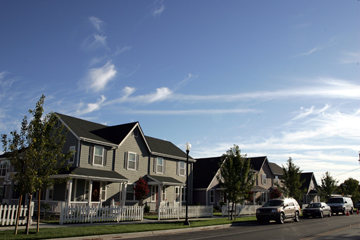San Juan looking for options
Two failed measures leave city short on money
San Juan Bautista residents said an emphatic no to Measure B, a
ballot item that would have increased the city’s growth cap to
bring it into compliance with state law. Measure B’s failure leaves
the city vulnerable to lawsuits and ineligible for millions of
dollars in state funds.
San Juan looking for options
Two failed measures leave city short on money
San Juan Bautista residents said an emphatic no to Measure B, a ballot item that would have increased the city’s growth cap to bring it into compliance with state law. Measure B’s failure leaves the city vulnerable to lawsuits and ineligible for millions of dollars in state funds.
Jan McClintock, city manager of San Juan, was not surprised that the measure failed.
“I’m concerned,” she said. “Our growth ordinance is in violation of state law.”
The measure lost by 10 percentage points, with 53 percent of voters saying no, according to numbers posted on the San Juan city Web site. Just over 300 votes were cast.
The city council will address the issue in a closed session Nov 20, McClintock said.
Voters also rejected Measure C, an initiative that would have increased the city’s sales tax by .5 percent, bringing the total sales tax to 8.5 percent. The measure failed 52 percent to 48 percent.
Every city needs the housing component of their general plan certified by the California Department of Housing and Community Development. A three percent growth cap would have brought the city’s housing element into compliance.
The city council will examine other ways to get the city’s housing element certified by the State, said Ed Laverone, a city council member.
For a small city facing budget problems, a certified housing element is important McClintock said. Grants from Housing could help pay for an economic development plan to revitalize downtown or for the community center remodel.
“It’s money that we desperately need,” she said. “We could have easily applied for between $3 and 5 million over a period of five years.”
The grants are competitive, but cities in San Juan’s financial situation, “tend to get substantial amounts of funding,” McClintock said.
The city has been ineligible for the grants since at least 2001.
“We are not facing a deficit at this time, but we don’t have any room to breathe,” McClintock said. “At this time we are paying the bills. We are not using our reserves.”
City officials will have to cut back on services, McClintock said.
There could be a reduction in law enforcement. San Juan has two full-time deputies that are assigned exclusively to San Juan. The city pays for both of them, but city officials could reduce that, she said
Library, city hall and the city planner’s hours might be reduced further. Currently, city hall is opened to the public Monday through Thursday from 9 a.m. to 1:00 p.m.
“That’s just some of it – there’s a full list of them,” McClintock said.
Basic services in San Juan have already been reduced, McClintock said. Library hours went from 63 hours per week to 28 hours per week. The city does not have a paid fire chief, and the building inspectors do not have office hours, they are on-call only.
“These are all things that the city council will have to look at,” McClintock said. “I don’t know what exactly will wind up happening. That’s a decision for the city council and the voters.”
The city council needs to improve its communication with citizens, Lavarone said.
“The city could have done a better job of vetting the ordinance before the public prior to its introduction,” he said, “to address the concerns of the public.”
The council needs to address the concerns of those who campaigned against the measure, such as the exemption for infill housing and the rollover of housing allotments, he said.
The council had very little time to review Measure B in order to meet deadlines for the Nov 6 ballot.
“Maybe if we had worked a bit slower or began the process earlier we could have been successful,” he said.









